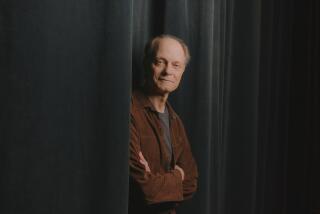Additions Add Little to ‘Crucible’
- Share via
IRVINE — George S. Kaufman not only was one of this century’s best American playwrights; he also was the great play doctor of his day. “When in doubt,” he once said, “cut.” That’s good advice for every playwright.
The advice was followed by Arthur Miller. Cuts were made in his powerful script of “The Crucible,” and it became a better play. But David Wheeler, director of a revival at the Irvine Barclay Theatre, has an opposing opinion.
Wheeler has reinstated a scene between protagonist John Proctor, a farmer accused of witchcraft, and villainess Abigail Williams. It is a gratuitous scene and should have stayed cut. It adds no information and slows the spiral of terror and fear with which Miller envelopes Salem, Mass., during the famed witch hunts.
The director also has seen fit to add characters’ explanations to the audience, of who the characters are and why they are in the play. These explanations are Miller’s notes from the manuscript and are not intended for performance. Besides further interfering with Miller’s carefully structured dramatic rhythms, these interruptions provide data useful only to actors during rehearsal.
If one can ignore these tamperings (which come across as so much “Mummie look at me” from the director), Wheeler has forged a forceful, visually impressive and dramatically powerful staging of Miller’s theatrical answer to Sen. Joseph McCarthy and his House Un-American Activities Committee, whose witch hunt was comparable to the Salem affair in its foolish panic and destruction of lives.
This is a play that should be revived for every generation, for each has its own version of the witch hunt. The lesson is laid out explicitly in Wheeler’s staging, which for the most part is impeccably cast. There are some uneven performances in smaller roles, but the integrity of the central figures is intact, and the dramatic chemistry between them crackles.
David Anderson is a dominant Proctor, building his characterization carefully from early geniality and calm to towering anger, a sense of righteous duty and his final agonizing plea for the sanctity of his name. Anna Fitzwater as his wife, Elizabeth, is not far behind in her portrait of a woman whose deep and firm religious sense of right follows her through the tragic unwinding of her blameless life.
As the selfish and manipulating Abigail--who accuses everyone who ever has crossed her, particularly Proctor’s wife and, ultimately, Proctor, the man she covets--Ashley West Leonard gives a striking performance rich in contrast and detail.
But her evil becomes dim in the shadow of the religious and legal figures who, in the name of God, follow her pointing finger. The imposing force of Dudley Knight’s Deputy Gov. Danforth, the opaque waffling of Jeff Renard’s Judge Hathorne and the frenetic bigotry of Fran Gallegos’ Rev. Samuel Parris all make indelible statements about those who believe that their right must be everyone’s.
As the Rev. Hale, the only hunter of witches who soon realizes the evil of the crusade, Damon Kupper provides an incisive portrait of sanity in an insane world.
One addition of Wheeler’s which is theatrically beneficial is the shadowy dance of the girls in the woods, which triggers the madness. His placement of the first scene between Proctor and Abigail in the forest also is an effective alteration.
* “The Crucible,” Irvine Barclay Theatre, 4242 Campus Drive. Thursday-Friday, 8 p.m.; Saturday, 2 and 8 p.m. Ends Saturday. $11-$15. (714) 824-2787, (714) 854-4646. Running time: 3 hours, 15 minutes.
David Anderson: John Proctor
Anna Fitzwater: Elizabeth Proctor
Ashley West Leonard: Abigail Williams
Damon Kupper: Rev. Hale
Frank Gallegos: Rev. Samuel Parris
Jeff Renard: Judge Hathorne
Dudley Knight: Deputy Governor Danforth
A Drama at UCI production of a play by Arthur Miller, directed by David Wheeler. Scenic design: Cliff Faulkner. Lighting design: Caitlin Guyan. Costume design: Linda Davisson. Choreography: Annie Loui. Composer: Alan Terricciano. Stage manager: Veronica Horton.
More to Read
The biggest entertainment stories
Get our big stories about Hollywood, film, television, music, arts, culture and more right in your inbox as soon as they publish.
You may occasionally receive promotional content from the Los Angeles Times.










